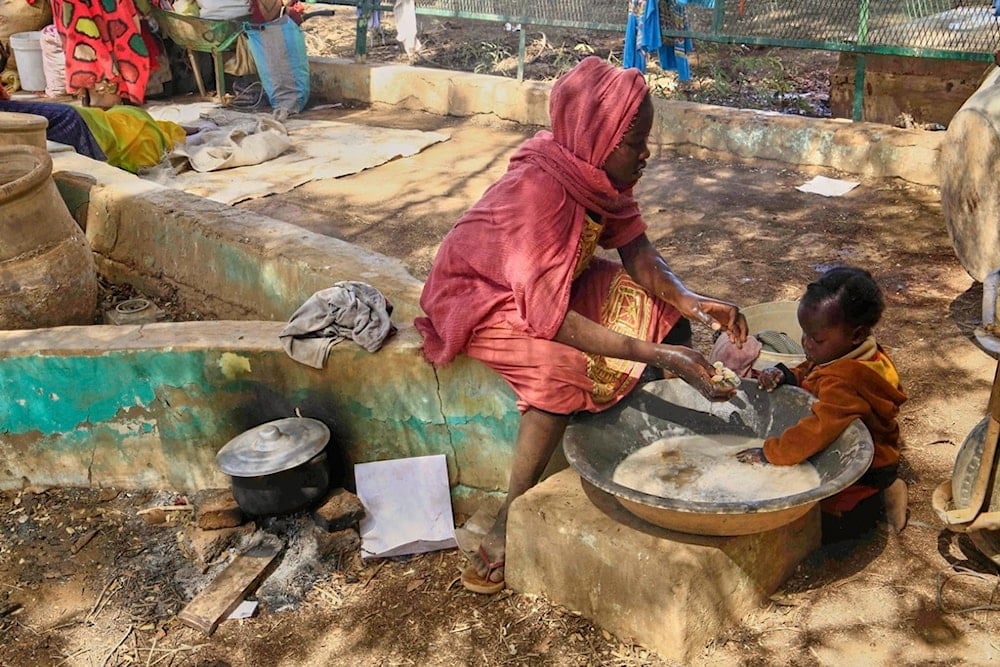Aid groups warn of mass starvation in Sudan as global support wanes
With over 30 million people—nearly two-thirds of the population—now reliant on emergency assistance, the country is sinking deeper into famine, mass displacement, and violence.
-

Sudanese displaced families take shelter in a school after being evacuated by the Sudanese army from areas once controlled by the paramilitary Rapid Support Forces (RSF) in Omdurman, Sudan, located across the Nile River from Khartoum, on Sunday, March 23, 2025 (AP Photo)
As Sudan enters its third year of war, leading international humanitarian organizations are raising the alarm over what they describe as an unprecedented catastrophe. With over 30 million people—nearly two-thirds of the population—now reliant on emergency assistance, the country is sinking deeper into famine, mass displacement, and violence.
In a joint appeal released ahead of a high-level ministerial conference on Sudan in the United Kingdom, the heads of the Danish Refugee Council, International Rescue Committee, Norwegian Refugee Council, CARE International, and Mercy Corps called on global leaders to act without delay. Without urgent intervention, they warn, the crisis will claim countless more lives.
"The world's failure to fund humanitarian action in Sudan has now become the biggest obstacle to saving lives," the statement reads. The 2025 humanitarian response plan—estimated at $4.1 billion—has received only 10 percent of its required funding. This shortfall is forcing local organizations to shut down critical services, including mobile clinics and communal kitchens that have served as lifelines for vulnerable communities.
Conditions across Sudan continue to deteriorate. Humanitarian agencies report relentless assaults on civilians and widespread use of sexual violence. "Women and girls endure systemic sexual violence," the statement adds, calling it one of the conflict's most horrifying features.
Displacement is surging. More than 3.7 million Sudanese—mostly women and children—have fled to neighboring countries such as Chad, South Sudan, and Ethiopia, only to face overcrowded camps and scarce resources. Aid workers caution that these fragile host states are reaching a breaking point, with regional tensions escalating and humanitarian systems stretched to the limit.
The imminent rainy season is expected to worsen access to affected communities by flooding transportation routes and cutting off humanitarian corridors.
Read more: Following US aid cuts, 8 die in South Sudan in search of medical help
Despite the growing scale of the crisis, international support remains, in the words of the appeal, "too slow, too timid, and dangerously inadequate." The signatories call on the upcoming conference to mark a "turning point," urging world leaders to secure a ceasefire, guarantee safe passage for aid, and fully fund humanitarian operations.
"When funding dries up, people don't just suffer—they die," the letter warns.
The statement is signed by Charlotte Slente (Danish Refugee Council), David Miliband (International Rescue Committee), Jan Egeland (Norwegian Refugee Council), Reintje van Haeringen (CARE International), and Tjada D'Oyen McKenna (Mercy Corps). They stress that the time for promises has passed—only immediate, tangible action can prevent further catastrophe.
Humanitarian Collapse
The appeal comes amid a broader global pullback from humanitarian funding, particularly from the United States, historically the world's largest aid donor. In January, President Donald Trump signed Executive Order 14169, enacting a 90-day freeze on US foreign development assistance. Weeks later, his administration announced it would cancel over 90 percent of USAID's overseas contracts, slashing approximately $60 billion from Washington's global aid budget.
The repercussions have been swift. The Norwegian Refugee Council reports that clinics and schools serving Sudanese refugees in Chad have already been shuttered due to funding gaps. The World Food Programme warns that nearly 25 million people in Sudan now face acute food insecurity, with famine confirmed in at least 11 areas. To reach 7 million people over the next six months, the WFP says it urgently needs an additional $650 million—a target far from being met.
"This catastrophic gap is forcing Sudanese local responders to shut down life-saving communal kitchens and mobile clinics," the joint appeal explains. "Yet they are the backbone of the humanitarian response, saving lives daily."
As world leaders prepare to meet in London, aid groups insist that without bold financial commitments and political resolve, the consequences will be irreversible.
"This cannot go on."
Read more: Sudan accuses UAE of violating Genocide Convention in Darfur

 4 Min Read
4 Min Read









